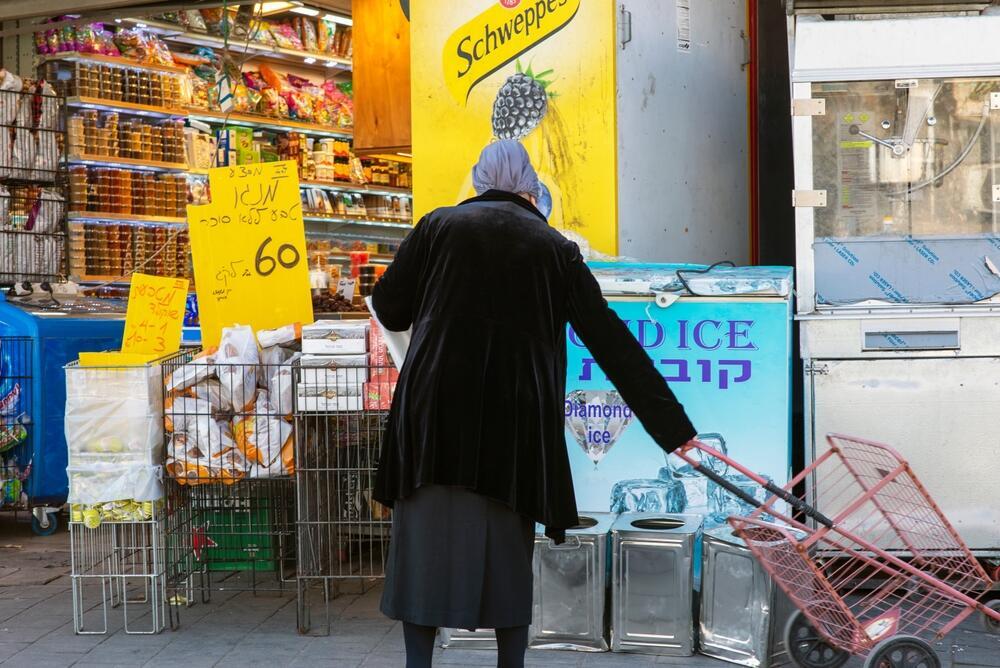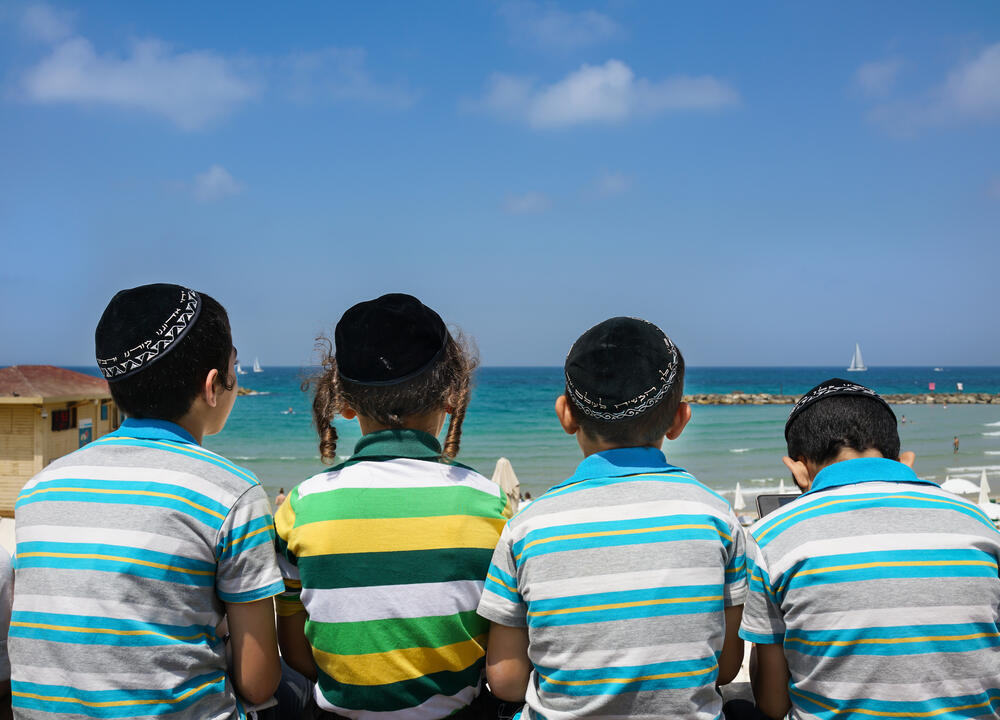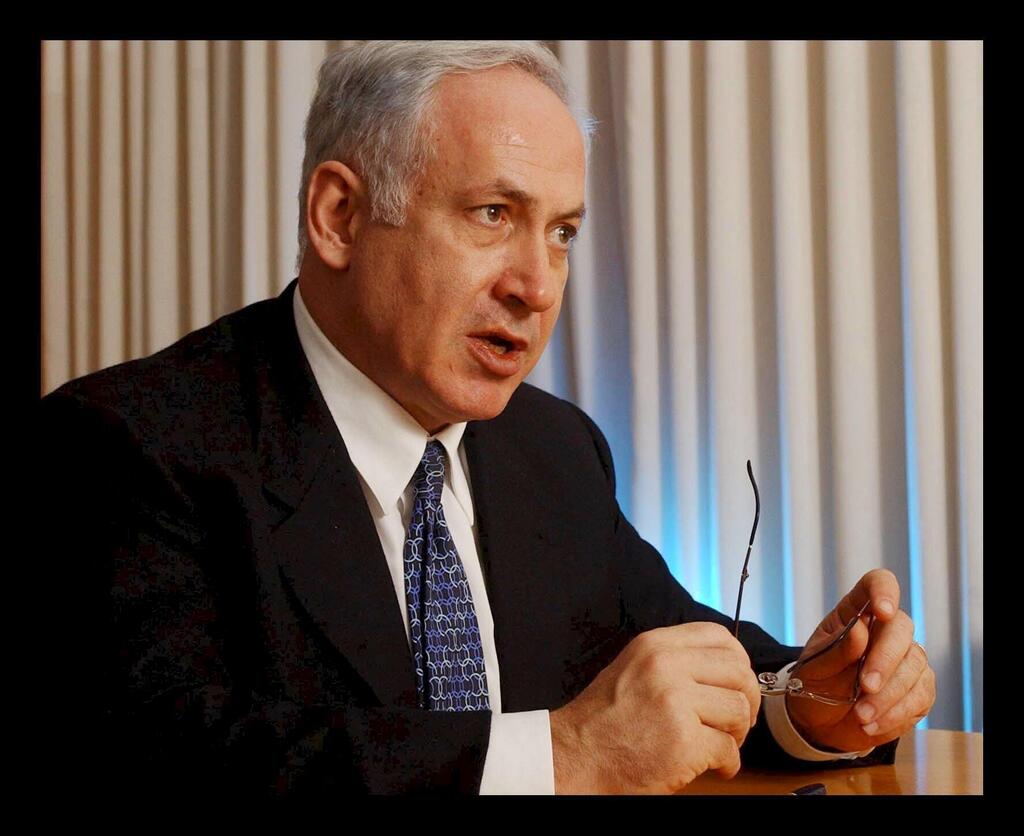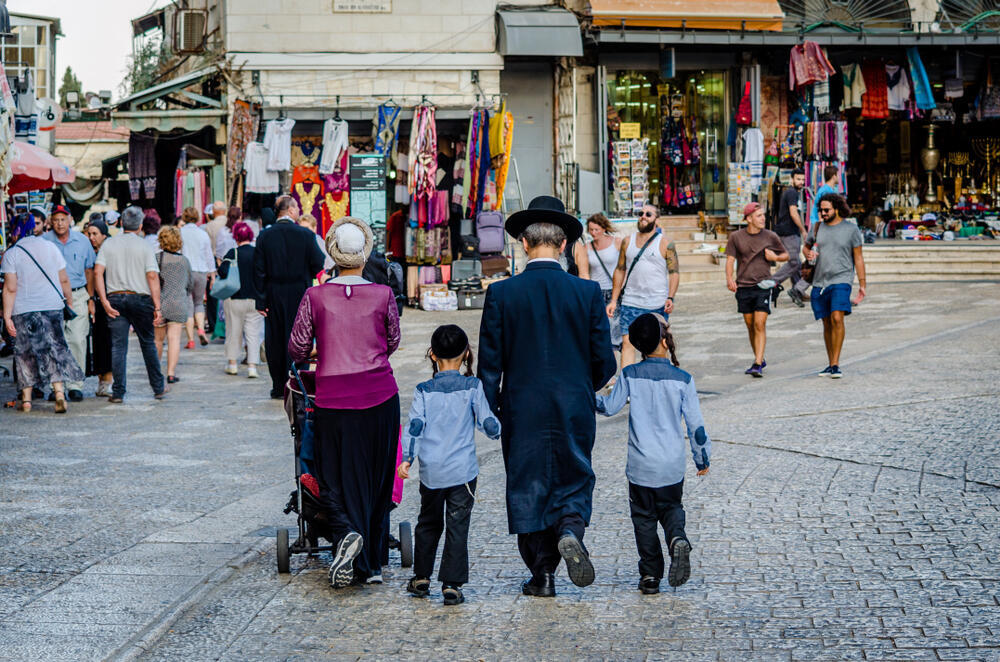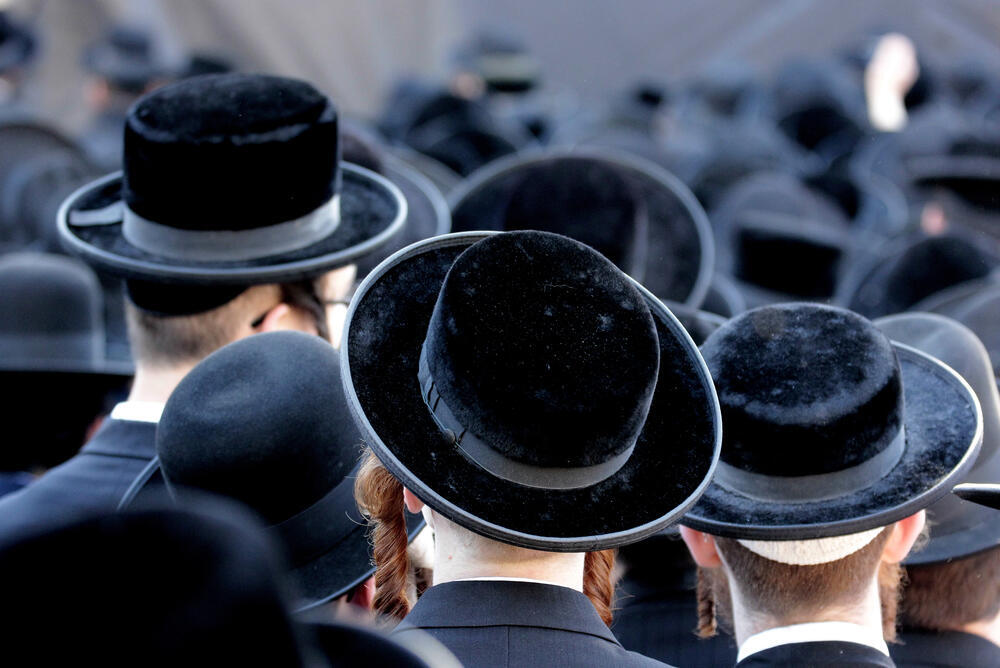Getting your Trinity Audio player ready...
A basic Google search of the terms "ultra-Orthodox" and "money" brings up a plethora of articles and mentions by journalists and columnists about a central combination - the ultra-Orthodox and welfare. But why do the ultra-Orthodox rely on welfare? Why have successive prime ministers been eager to grant it? And what is really happening in the ultra-Orthodox economy, assuming such a thing exists at all?
More stories:
To begin to understand the current situation, one must go back to the early 1970s. Old data on employment rates and income of the ultra-Orthodox population during those years present an intriguing picture: Ultra-Orthodox men worked at employment rates quite similar to non-Haredi Jewish men. Women, on the other hand, mainly stayed at home and raised children, much like traditional households in a conservative society (and many secular families of that time). However, the picture dramatically changed from then on.
During the 1970s, a period referred to by sociologists as the "golden era of the Israeli welfare state," significant changes occurred in the labor market. Daycares and institutional frameworks for early childhood development were established, enabling Israeli women to enter the workforce. Child allowances became accessible to everyone based on the number of children they had.
Suddenly, assistance was available for almost everything. For instance, when my mother (a secular woman at the time) wanted to buy an apartment, she simply wrote a polite letter to the Housing Ministry explaining her financial difficulties, and presto - she was granted a mortgage with fairly convenient terms on behalf of the State of Israel.
In fact, any family with more than four children would receive numerous discounts - at the pool, at the library and subsidies for nearly every public service. It was truly a wonderful thing; finally, the State of Israel began to view its citizens as having the right to a decent life after years of austerity and threats of extinction from its neighbors. But there was someone else who identified the immense potential of this new and socialist vision that suddenly unfolded for everyone - Rabbi Elazar Menachem Shach, the leader of the ultra-Orthodox community during those years, a man even his opponents would describe as charismatic and visionary.
Rabbi Shach saw the new economic reality as a golden opportunity to fulfill his religious vision of cultural segregation. Therefore, he advocated for more and more ultra-Orthodox men to study Torah in yeshivas and refrain from entering the workforce, so they would not be exposed to the secular world outside. The notion was that, in parallel, women could provide for the family, and thus, with God's help and the generosity of the Jewish state, the family would flourish.
The turning point for the Haredi sector
In the 1970s. During this period, there was a significant decrease in ultra-Orthodox men entering the workforce (and serving in the military), alongside a notable surge of ultra-Orthodox women joining the workforce as teachers, secretaries and saleswomen.
The pivotal moment came with the political shift of 1977 when Menachem Begin and his Likud Party came to power and formed a coalition with the ultra-Orthodox parties, thereby unseating the ruling Labor Party for the first time since Israel’s inception.
He had no choice; without their support, he couldn't have formed a government. The coalition agreements between the parties were signed, and for the first time, mandatory military service exemptions were strictly limited to those "whose Torah is their profession."
Over the next two decades, the ultra-Orthodox sector evolved into what Prof. Menachem Friedman later termed the "society of learners." Throughout the 80s and 90s, this development proceeded with little disruption. The education of ultra-Orthodox boys declined as the focus shifted to training students.
In fact, neither left-wing nor right-wing governments had a real interest in changing the situation. On the contrary, they preferred to throw a few shekels to the Haredim in Bnei Brak to keep them quiet, allowing secular authorities to govern undisturbed. This arrangement worked fairly well until demographic changes altered the rules of the game.
Shmuel Halpert was a member of the Knesset in Ehud Barak's government in 2000 (yes, even the left needed the ultra-Orthodox in the coalition). In a controversial move, he raised the threshold of child allowances from the fifth child and above. These inflated child allowances, reaching several thousand shekels per month, sparked a significant public uproar.
In 2003, Benjamin Netanyahu, the finance minister in Ariel Sharon's government, decided to put an end to it. He made significant cuts to child allowances, pushing hundreds of thousands of ultra-Orthodox (and Arab) children below the poverty line.
The party, as it seemed at that time, came to an end. This move dramatically expedited various integration processes between the ultra-Orthodox sector and general Israeli society, with the common link being the economy. This was reflected in programs for military service that began to develop, academic paths, vocational training and more, all designed to help Haredi men overcome their almost complete lack of formal education and earn money.
"Politicians (especially Benjamin Netanyahu) learned that it was not in their interest to cut the ultra-Orthodox, as they wouldn't like it and wouldn't want to be in a coalition with them again if they repeated such actions"
From around 40% employment at the time of Netanyahu’s cutbacks in 2003, that figure rose to 53% by 2023 following considerable efforts and billions invested in "integration."
Why so little? Primarily because the policy didn't hold over time. Ultra-Orthodox representatives quickly resumed their control, and child allowances and subsidies were reinstated shortly afterward.
In essence, two things happened around that time in 2003. Politicians (especially Benjamin Netanyahu) learned that it was not in their interest to cut the ultra-Orthodox, as they wouldn't like it and wouldn't want to be in a coalition with them again if they repeated such actions. On the other hand, politicians whose official tactic was to make deep cuts to Haredi child allowances and subsidies (Lapid the father and Lapid the son) didn't quite deliver to the delight of the ultra-Orthodox.
One sector, two economies
Meanwhile, within the Haredi sector itself, two parallel economies began to emerge in the early 2000s. One economy is characterized by substantial scarcity (with 48% poverty, after all). The mindset is highly frugal, living on a severely constrained budget and significant reliance on various charities within the ultra-Orthodox community - starting from weekly food rations to eyeglasses and dental care.
Almost simultaneously, another, more bourgeois economy started developing, based on consumption and a sharp rise in living standards. But we will come to that shortly. First, it's worth focusing on how the ultra-Orthodox cope with significant economic hardship.
Alongside the various charities and generous economic assistance upon which impoverished ultra-Orthodox families rely, there are also Gmachim (acronym for Gmilot Chasidim), which are frameworks that allow interest-free loans for various purposes, such as renovations, financing weddings and other essential needs. Until today, the Bank of Israel has attempted to estimate the amount of capital circulating in these unofficial banks; a single-digit billion figure is a rough estimate by economists. However, it remains speculative.
Another way to cope with the situation is through unreported work, colloquially known as "working under the table.” These involve various economic combinations and unreported side jobs, from the opening of the cholent complex for yeshiva students to collecting brokerage fees on properties, fundraising, assistance in exercising rights and a host of activities under the radar of government authorities, especially the tax authorities. Women, too, engage in unreported work, such as baby care and various home-based businesses.
It should be noted that the incentive to avoid reporting income for tax purposes has decreased due to negative income tax and earned income tax credits, which taught the ultra-Orthodox that reporting and benefiting from assistance might be worthwhile.
However, many ultra-Orthodox men, fearing conscription or uncertain about their child's education, often choose not to update their income status and withhold information from authorities, leading to suspicions and scrutiny of their actions. Any communication with authorities is met with considerable suspicion.
Another issue is real estate. When I got married, many of my friends received an apartment as a gift from their parents. The mortgage, if there was one, was paid by their parents, and the couple essentially began their lives with a roof over their heads.
Today, this still happens, but it's becoming rarer. Young ultra-Orthodox couples nowadays take mortgages like everyone else (and struggle with the skyrocketing interest rates). However, for my generation, owning an apartment was quite the gift.
I know several talented and intelligent individuals who chose to leverage their existing apartments and purchase additional properties to rent them out for extra income. Some have done this more than once and become real estate investors.
Nowadays, the ultra-Orthodox real estate industry has significantly developed. Physical acquisition of additional properties is no longer necessary; every larger apartment can be divided into one or two units and rented out to young couples. Sometimes, closed warehouses and stores serve the same purpose.
These rental incomes did not need to be reported until recently. Even today, the reporting requirement for rental income stands at NIS 5,500 per month. Anything below that amount can be another blessed, but transparent, addition to the budget of a financially struggling ultra-Orthodox family.
It's impossible to truly forego core studies
Here is the place to emphasize that success and earning a high salary for men coming from a deprived ultra-Orthodox education is an almost impossible task. Social mobility through academia doesn't succeed. Dropout rates from academic studies may not be as high as before, but they are still significantly higher compared to other student groups. The notion of excelling in Talmud studies leading to a master's degree in economics or psychology simply crashes too often on the harsh reality.
Generally, ultra-Orthodox academics continue to maintain a 30% income gap from their non-Haredi counterparts. As a result, those who feel that their place is no longer within the walls of the seminary also do not feel they have a real job prospect or the practical ability to translate their skills into income.
Moreover, leaving the seminary means losing various subsidies and discounts that "hold them back” and allow them to get by, even if only barely scraping by. It also means losing social prestige. Working low-paying menial jobs like cooking or shelf-stacking in a supermarket to highly capable and skilled individuals whose only sin is not having received a formal education at a young age imposes a heavy social toll. If you lack strong financial support for long-term studies and a high level of academic ability, especially in English, it's a waste of time. Ultra-Orthodox men know this, so many stay in the seminary. There's just too much to lose by leaving.
However, the integration of technology into the Haredi community (and yes, it's a battle the rabbis have largely lost) also exposes them to how "the other side" lives.
Now is the time to re-enter the secular economy, the bourgeois economy. Alongside a very impoverished community (and very ultra-Orthodox), a significant ultra-Orthodox middle class has emerged in the past two decades. This can be seen clearly in the numbers.
Ultra-Orthodox women who entered the job market have effectively bridged the gap between themselves and non-Haredi Jewish women, contributing financially to the family unit. This is in addition to ultra-Orthodox men who managed to close educational gaps in vocational or technological fields reasonably well. Many also succeeded through connections to secure various key positions, particularly in the public sector.
It's a thriving job market highly dependent on ties to ultra-Orthodox political representation. Some even work in the industry of “integrating Haredim”, a prosperous sector in its own right. This group simply lives differently and has different needs.
It's not just premium products that were absent from the average ultra-Orthodox supermarket shelves in the past, not because of religious restrictions but simply because they were prohibitively expensive. Today, it has become a genuine consumer culture that no longer shies away from its mainstream Israeli counterpart.
The indulgence in clothing, electrical appliances, vehicles, furniture and of course, pampering vacations, both domestic and abroad, is prevalent. Just open an average ultra-Orthodox newspaper and witness the abundance of advertisements. The money enabling this consumption doesn't come from welfare or subsidies but from income and capital.
So what's going on here?
In summary, there is an undeniable rise in the standard of living among the ultra-Orthodox public, particularly in the growing middle class. However, this improvement is largely dependent on a service-oriented economy closely tied to ultra-Orthodox politics rather than professional skills, making it more susceptible to economic changes.
Nevertheless, the bourgeois economy of the ultra-Orthodox middle class still maintains a significant and clear gap compared to non-Haredi Jews. Meanwhile, state policies of welfare and subsidies continue, helping the impoverished ultra-Orthodox survive but not providing them with significant economic prospects.
Despite a brief decline after the short-lived 2003 budget cut, the ultra-Orthodox population has not significantly shrunk. An overall decrease of about 20% in ultra-Orthodox birth rates over the past two decades still yields large families with six or seven children on average.
Consequently, around 60% of the ultra-Orthodox population is below 18 years of age. Different expert estimates indicate that the state loses around NIS 6 billion annually in tax revenue due to the fact that ultra-Orthodox men do not work.
This policy's sustainability is at risk as the percentage of the population it affects grows. It cannot work in the long term or promote full financial independence because of insufficient education at a young age. As a result, we are already witnessing widespread public discontent.
Even from the ultra-Orthodox perspective, where they see how the other side lives thanks to the Internet revolution, it is evident that the grass is indeed greener. When the ultra-Orthodox fail to close the gaps and are forced into low-paying jobs or positions dependent on the favors of businessmen and insiders, they develop their own social grievances.
This complex situation requires novel thinking and a new social contract, perhaps with public representatives from all political parties who can perceive the future of society as a whole. These representatives must understand that time is ticking, and the economic reality being woven between these two ultra-Orthodox economies poses a danger to the shared future of both ultra-Orthodox and secular individuals alike.


